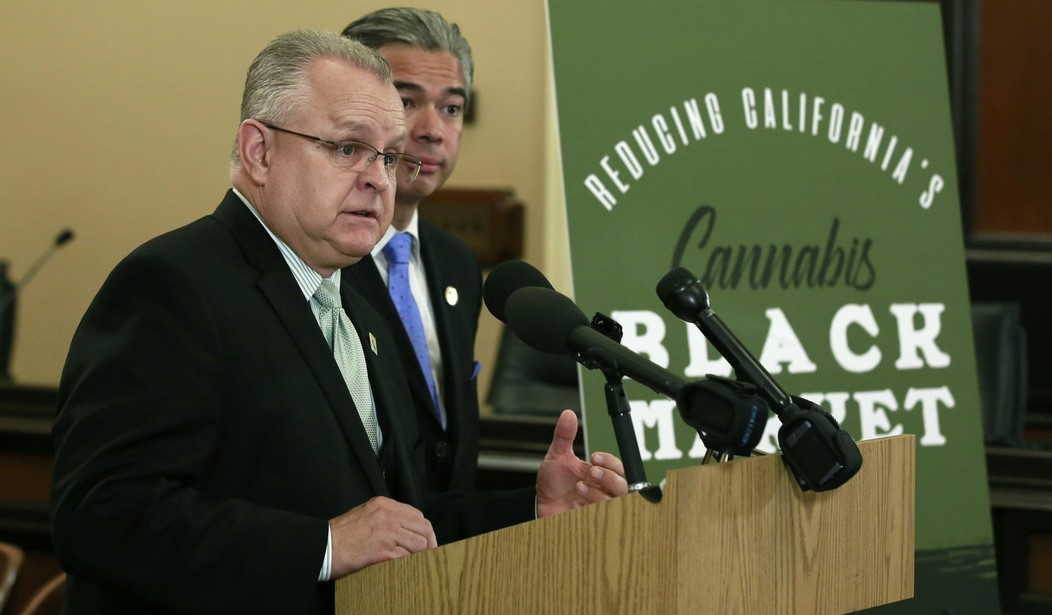Less than 90 days after getting the legal green light to make pot smokers’ eyes red, California’s recreational marijuana industry was already back in Sacramento begging politicians for help.
“This is an industry in crisis,” Kristi Knoblich, president of the association’s board and co-founder of Kiva Confections, a manufacturer of edible cannabis products, said to a panel of lawmakers at an industry gathering in March. “This is me sounding the alarm.”
What’s the problem? How could these people not make a profit selling pot? Isn’t government permission to sell marijuana like a license to print money?
Maybe the problem is the price of the license.
There’s no doubt Californians want legal pot. An Arcview Market Research, BDS Analytics, study predicted demand for marijuana would be three times greater in California than any other state by 2021.
“Rarely does a 20-year-old market undergo as radical a transformation in as short a time as California’s cannabis market did on January 1st of this year,” said Tom Adams, editor-in-chief at Arcview Market Research and Principal Analyst at BDS Analytics. “Suddenly, 29 million adults had access to the cornucopia of the modern cannabis store but were also suffering sticker shock from the state-imposed costs of going legal.”
But here’s the bad news: the study also showed legal weed growers and sellers can’t compete with the cut-rate prices offered by their counterparts on the other side of the law.
Troy Dayton, CEO of the Arcview Group, which does market research for the cannabis industry, said legal pot growers deal with more than 40 different types of state licenses and a long list of county and local regulations. And that doesn’t even begin to take into account the tax burden shouldered by legal businesses in California.
Add it all up, and the Arcview study showed the cost of doing a legal cannabis business in California —thanks to taxes and regulations — is as much as 77 percent higher than growing and selling grass on the black market.
“It’s clear that every additional penny of price increase on legal cannabis products only serves to boost the attractiveness of purchasing from the illicit market, which has flourished in the state for decades,” Dayton said in a statement.
The study concluded that “unlicensed growers with well-established distribution could potentially siphon customers from licensed retailers and, in turn, stunt the revenue gains expected from cannabis taxes.”
You know Sacramento is not going to like that. But never fear – a bipartisan group of California politicians is riding to the rescue.
GOP Assemblyman Tom Lackey, a former California Highway Patrol officer, admitted the state’s legal marijuana industry had “gotten off to a ragged start” because black-market pot dealers are able to woo customers who don’t want to pay taxes that are as high as 45 percent in some cities.
“High effective tax rates on California cannabis may complicate the state’s efforts to establish legal markets” predicted analysts Stephen Walsh and Karen Ribble in a Fitch Ratings report on California’s marijuana taxes, which was released last October.
Lackey is no friend of the marijuana industry. He voted against legalizing medicinal marijuana. But Lackey is a friend of California’s business community and a former cop who doesn’t like the bad guys.
“Criminals do not pay business taxes, ensure consumers are 21 and over, obtain licenses or follow product safety regulations,” said Lackey. ”We need to give legal businesses some temporary tax relief, so they do not continue to be undercut by the black market.”
So, Lackey, along with four California Assembly Democrats, has offered a proposal to lower taxes on licensed sellers and growers of cannabis for three years. The state excise tax would fall from 15 percent to 11 percent for those three years, and the legislation would suspend a cultivation tax of $148 per pound of pot.
Hezekiah Allen, executive director of California Growers Association, a marijuana trade group, told the Los Angeles Times the proposal would be a “huge step in the right direction.”
But it’s only one step.
Let’s face it: No matter how much politicians cut taxes on the legal recreational marijuana business, they are never going to fall as low as the tax rate paid by illegal growers and sellers, which is zero.
The cost of running a legal marijuana business in California is not the only problem facing the industry. The Fitch Report, released in October 2017, also pointed out the legal marijuana industry is made up of rookies competing with black-market weed growers and sellers entrenched in California for decades.
“California’s black markets for cannabis were well established long before its voters legalized cannabis in November 2016,” read the Fitch Report, “and are expected to dominate post-legalization production.”
Anthony Silvaggio, a Humboldt State University environmental sociologist, said no matter what Sacramento does about the legal pot business’ tax burden, there is no reason to believe people growing pot illegally will stop.
State economists issued a report in January showing that 135 million tons of cannabis were grown in California annually, but only 2.5 million tons are consumed. Where’s the rest of it going?
Out-of-state. A month before weed went legal in California, Marijuana Business Daily speculated the price of wholesale cannabis could slide to $500 a pound in California.
But, Silvaggio said, a California grower could sell his weed to the Nevada black market for as much as $3,600 a pound. Why would any black-market operator want to go straight?
“People make a lot more money (on the black market),” Silvaggio said, “because it’s still profitable to grow on public lands illegally.”








Join the conversation as a VIP Member